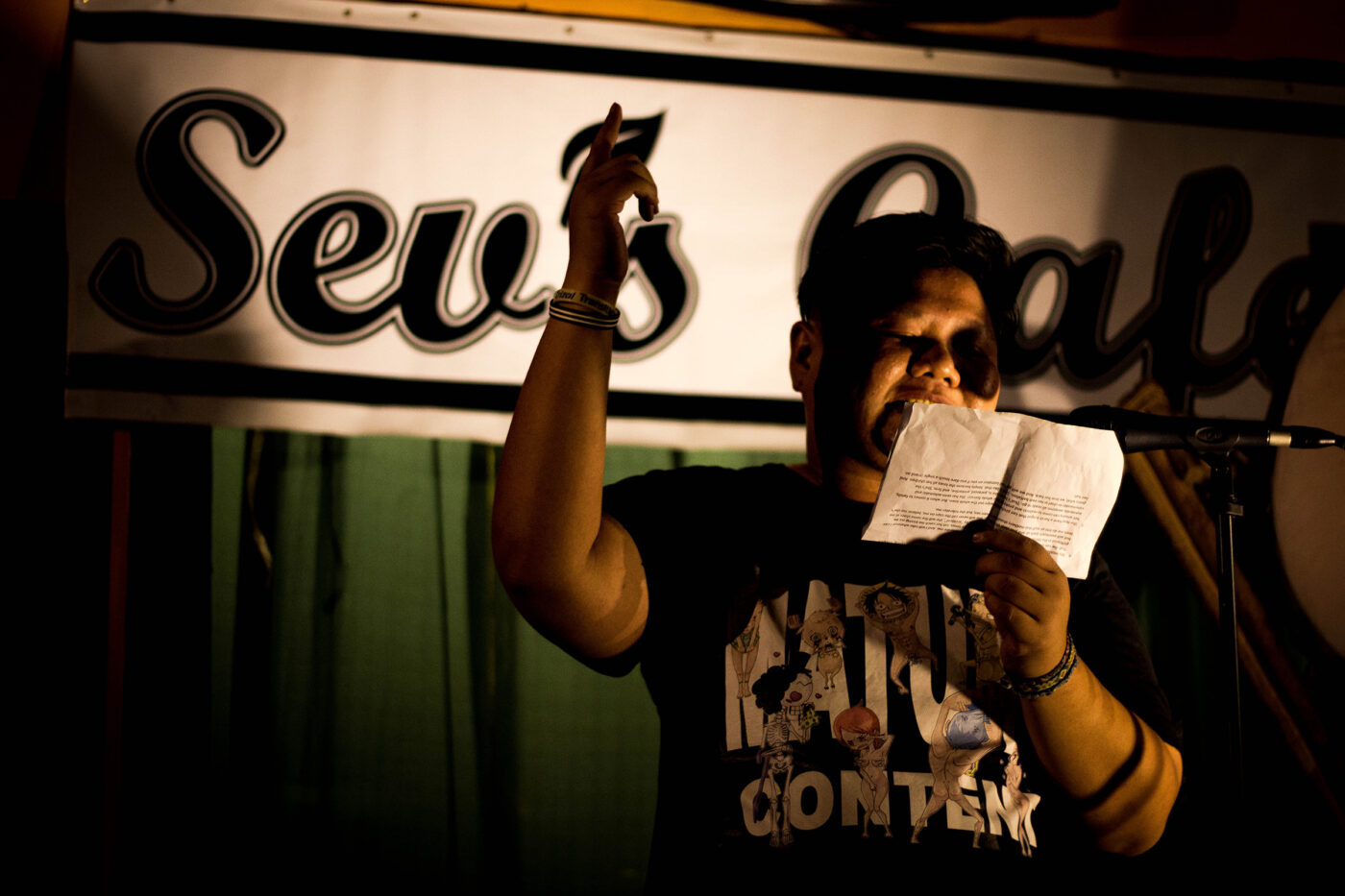“Poetry is best served with alcohol,” declares Abby Orbeta (AB SoS ‘06), the host of the night’s festivities, as she holds up a shot glass filled to the brim. The small crowd gathered at Sev’s Cafe laughs; some even raise their beers in response. Although many of tonight’s patrons are first timers (or virgins, as Orbeta jokes), the atmosphere is a warm one.
Located in Malate, this cozy restaurant is owned by renowned journalist Howie Severino and his wife, Ipat Luna-Severino, who is an environmental lawyer and theater arts enthusiast. It welcomes all forms of art, having served as a venue for documentary screenings, musical acts and poetry slams.
Orbeta passes a notebook around, encouraging people to sign up for the open mic. Moments later, she again takes to the stage to perform an original poem entitled “March 11.” The room falls silent as she begins to speak. Much like the other spoken word poets who come after her, hers is a tale of love and loss.
Spoken word is an art form that many have become familiar with thanks to the likes of Andrea Gibson, Phil Kaye and Sarah Kay. Because of their YouTube videos, we’ve marveled at their clever turns of phrase and been moved by their emotional performances.
Nowadays, local spoken word enthusiasts can experience this closer to home, as spoken word poets and groups have sprung up to promote the art on our shores.
Up close and personal
“‘Happy birthday! Would you like for me to perform a poem for you as a gift?’” Creative writing senior Jam Pascual smiles as he recalls what fellow spoken word poet Jake Jereza (BS CTM ‘14) said when they first met. “He performed ‘I Do’ by Andrea Gibson, which is one of my favorite spoken word poems and one of my favorite poems to perform, and after that I kept getting into other spoken word poets.”
As for Jereza, his first encounter with spoken word was through the Internet. The virality of other spoken word poems like “OCD” by Neil Hilborn and “What Teachers Make” by Taylor Mali has certainly generated more appreciation for the art form. Even people who usually aren’t interested in literature suddenly become curious, clicking one link after another.
According to Jereza, “I came across a piece by Andrea Gibson on my friend’s Tumblr. I left it at the back of my mind for a few months and then I decided to write my own. [My first piece] had a little music in it; I sent it to my Valentine date.”
Much like Pascual, Serge Gabriel (BS PSY ‘13) owes his initial foray into spoken word to a close friend. “I was a sophomore in Ateneo when one of my band mates told me that he was setting up a gig that had jazz music, poetry reading and coffee. Knowing full well that I wrote [poetry], he asked me if I wanted to recite some of my work,” he shares.
Perhaps for many spoken word artists, much of the art’s appeal lies in its ability to democratize art. “We look at printed art as something that should be left to scholars, to the professionals, but you don’t look at spoken word poetry that way,” Pascual observes. “Because it’s personal, it’s the sort of thing that can be approached more fearlessly and with less apprehension.”
It is because of this openness that spoken word poets are able to make their performancesso intimate. Whether it’s race, homosexuality, addiction or heartbreak, the everyday topics that poets tackle make the experience of going onstage a cathartic one.
“You can write whatever you want to write, say whatever you want to say, express whatever emotions you have. Your words can allow other people to put words to emotions that they themselves can’t find the words for yet,” says Louise Meets, a member of Speak! Philippines, a community of Filipino spoken word artists.
Spreading the word
Like most information today, sites like Facebook, YouTube and Tumblr have played a significant role in the spread of spoken word poetry. In fact, this is how Speak! Philippines first began. Starting with a Facebook group that was created in March 2013, the group aimed to promote the appreciation of the art within the country.
But spreading the word doesn’t end there. “As spoken artists then, we didn’t have a place to perform. That was our biggest problem,” says member Michelle Manese. “So when we discovered Sev’s Cafe, it basically became our second home.” It is here that Speak! Philippines hosts a poetry slam every first Wednesday of the month and an open mic night on every third Saturday night.
The establishment of a stable and active organization can make a big difference in popularizing spoken word. “It’s not easy bringing together like-minded people,” Pascual shares. “There are spoken word poets scattered across the city who love what they do and want to share their stories, but don’t know where they can do it.”
Unfortunately, not all endeavors have been as successful. Ateneo Words Out Loud, a spoken word community for Atenean artists, has also been in the works since 2012. Despite several attempts to go beyond posts on the Facebook group, Karl Rojas (BS PSY ‘14), the administrator of the group, explains that nothing has really happened. “Starting an org kind of uses up a lot of time and effort and I don’t think that a lot of people were really ready to dedicate that much to something that wasn’t even guaranteed to be successful.”
Even without Ateneo Words Out Loud, there are other outlets for spoken word on campus. One such avenue is the Literary Society’s (Litsoc) HitLit Night, an annual event held during the School of Humanities Week where Atenean students and teachers are invited to perform. Litsoc President Juno Reyes clarifies that although it is not exclusive to spoken word, more spoken word enthusiasts signed up to performlast year.
Spoken word poets like Gabriel also consider Loyola Film Circle’s Under the Stars, an annual free-for-all nighttime film screening and variety show, as a good opportunity. “I auditioned with my poetry for Under the Stars back in 2013 and I was really glad they got me,” he says. “I think Ateneo is slowly opening its doors to this type of craft. I’ve definitely seen a lot more spoken word acts in school after graduating.”
Despite Gabriel’s optimism, there are those who disagree. For instance, in Jereza’s opinion, the movement still lacks consistency. “There’s HitLit, there’s Under the Stars, but those [events] only happen once a year,” he explains in a mix of English and Filipino.
Auspicious beginnings
Aside from providing spoken word enthusiasts with more avenues to perform, such events and organizations could also help people hone their skills and overcome their stage fright through workshops.
For Speak! Philippines, creating a safe space for the poets is a top priority. In a mix of English and Filipino, Meets says, “Whenever new people want to try spoken word, we invite them to our open mic nights and our slam nights. We make sure to give them a safe environment for them to try it out first so that their jitters during their first time subside a little.”
It isn’t just nervousness that holds spoken word poets back. For Rojas, who grew up in California, even financial security makes an impact. “I don’t think that freelance performances like spoken word would be used as a primary source of entertainment by different businesses here because spoken word lasts for like 10 to 20 minutes per performance, and musicians can have set lists that last even longer than that,” he observes.
However, in spite of these hindrances, Pascual is confident that spoken word is more than just a passing fad. “This is something that is going to go on and is going to grow. Hopefully some time in the future, spoken word gigs will become more common and hopefully there will be certain spaces that are dedicated to catering to that sort of thing.”
As of now, Speak! Philippines has a festival in the works, one that they hope will someday rival Queensland Poetry Festival’s Spoken in One Strange Word, an annual three-day festival in Australia that has been bringing together spoken word poets from all around the world for the past 18 years. Their home at Sev’s Cafe may be a small one, but there is no doubt that these poets aresetting the stage for bigger and better things to come.







